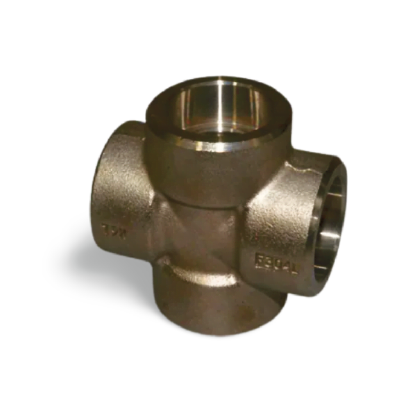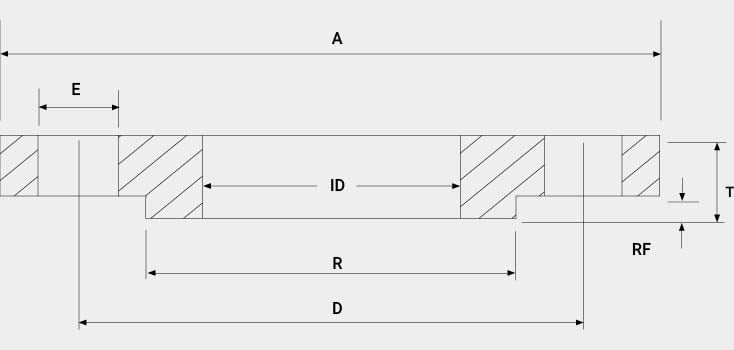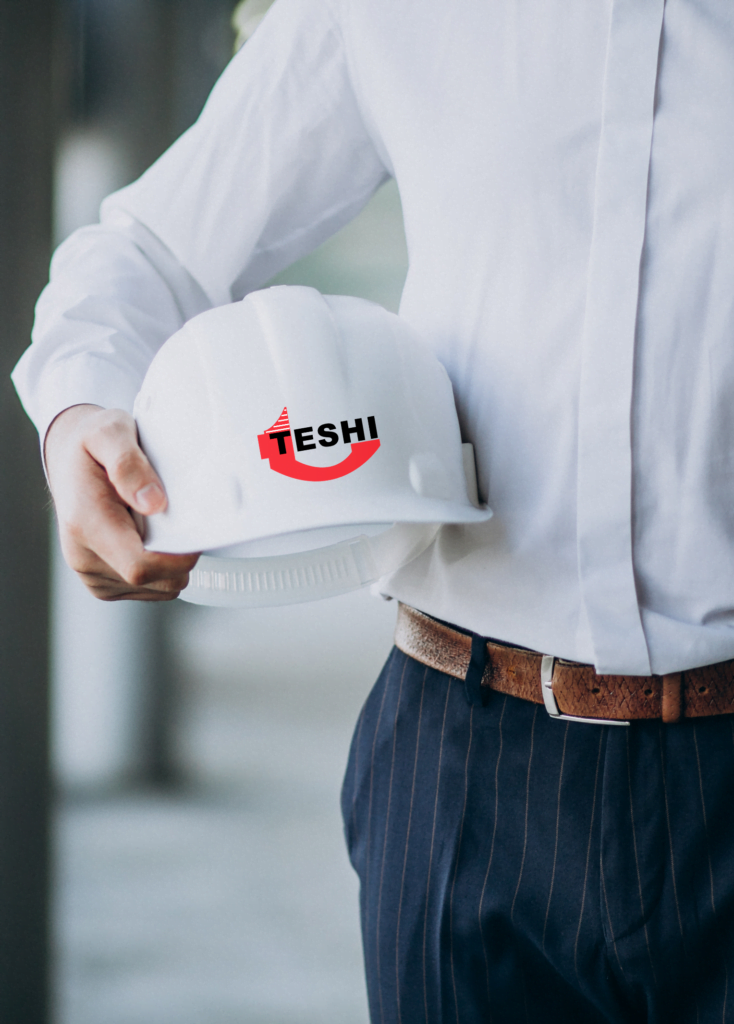Socket Weld Cross Manufacturer
Best Butt Weld Fittings Manufacturer in India since 1971.

Table of Contents
Teshi Group : Leading Manufacturer, Stockist, Supplier, and Exporter of Socket Weld Cross in India.
Teshi Group is a distinguished and leading manufacturer, stockist, supplier, and exporter of high-quality Socket Weld Cross fittings in India, catering to diverse industrial applications worldwide. Known for their exceptional durability, precision engineering, and superior performance, Teshi’s Socket Weld Cross fittings are essential components in piping systems, allowing for the secure connection of pipes in various high-pressure and high-temperature environments. With years of expertise in the field, Teshi Group has established itself as a trusted name, providing Socket Weld Cross fittings that adhere to stringent industry standards, making them highly sought after in sectors such as oil and gas, chemical processing, petrochemical, pharmaceutical, power generation, and more. The company’s advanced manufacturing facilities are equipped with cutting-edge technology and rigorous quality control systems, ensuring each Socket Weld Cross meets the highest benchmarks for reliability, dimensional accuracy, and corrosion resistance. As a major stockist and supplier, Teshi Group maintains a comprehensive inventory, which allows them to offer a vast selection of Socket Weld Cross fittings in various specifications to meet the precise needs of clients across the globe. The company’s commitment to excellence is further reflected in its robust logistics network, enabling timely deliveries and seamless export operations that meet international demands. Teshi Group’s focus on quality, coupled with a dedicated customer support team and technical expertise, ensures that their Socket Weld Cross fittings consistently provide the performance and safety required for critical industrial applications. Whether for standard configurations or custom requirements, Teshi Group’s range of Socket Weld Cross fittings is designed to deliver reliability, versatility, and value, reinforcing their position as a global leader in the piping and fittings industry.
About Socket Weld Cross :-
A socket weld cross is a type of high-strength pipe fitting designed to connect four pipes at a single junction, allowing for a smooth and efficient distribution of fluids or gases in piping systems. Known for its durability and pressure-resistant qualities, a socket weld cross features a socketed end on each branch, where pipes are inserted and secured with a fillet weld. This creates a robust and leak-proof joint that can withstand high-pressure applications, making it ideal for critical industries such as oil and gas, chemical processing, petrochemicals, and power generation.
Manufactured from materials like stainless steel, carbon steel, and various alloys, socket weld crosses offer excellent resistance to both corrosion and thermal stresses. These fittings are typically used in small-diameter, high-pressure piping systems where reliability and safety are paramount. The precise design and strong weld joint of a socket weld cross help minimize risks of leakage and enhance the structural integrity of the entire system. Available in various pressure ratings and sizes, socket weld crosses provide a streamlined connection option, especially suited for systems where compactness, cleanliness, and strength are critical. The installation process is straightforward, making socket weld crosses a preferred choice for creating durable connections in complex pipeline networks.
Dimensions of Socket Weld Cross

Teshi Group is an ISO certified Socket Weld Cross manufacturer & distributor in India
Standard Specification of Socket Weld Cross
Standard Specifications |
Dimensions |
ASME 16.11, MSS SP-79, MSS SP-95, 83, 95, 97, BS 3799 |
|---|---|
Size |
1/8" NB TO 4" NB |
Type |
Socket Weld Fitting Cross, Socket Weld Equal Cross, Socket Weld Unequal Crosss |
PRESSURE CLASS |
2000LBS, 3000LBS, 6000LBS |
Form |
End Caps, Pipe Caps, Pipe End Caps. |
Material & Grades of Socket Weld Cross
Material & Grades |
Stainless Steel Socket Weld Cross |
ASTM A182 F304, F304L, F306, F316L, F304H, F309S, F309H, F310S, F310H, F316TI, F316H, F316LN, F317, F317L, F321, F321H, F11, F22, F91, F347, F347H, F904L, ASTM A312/A403 TP304, TP304L, TP316, TP316L |
|---|---|
Duplex & Super Duplex Steel Socket Weld Cross |
ASTM A 182 – F 51, F53, F55 S 31803, S 32205, S 32550, S 32750, S 32760, S 32950. |
Carbon Steel Socket Weld Cross |
ASTM A105, A350 LF2, A106 Gr.B, A234 WPB |
Low Temperature Carbon Steel Socket Weld Cross |
ASTM/ASME A420 SA/420 WPL3, WPL6 |
Alloy Steel Socket Weld Cross |
ASTM / ASME A182, ASTM / ASME A335 GR P 1, P 5, P 9, P 11, P 12, P 22, P 23, P 91, ASTM / ASME A691 GR 1 CR, 1 1/4 CR, 2 1/4 CR, 5 CR, 9CR, 91 |
Nickel Alloy Socket Weld Cross |
ASTM B336, ASME SB336, Nickel 200 (UNS No. No2200), Nickel 201 (UNS No. N02201), Monel 400 (UNS No. N04400), Monel 500 (UNS No. N05500), Inconel 800 (UNS No. N08800), Inconel 825 (UNS No. N08825), Inconel 600 (UNS No. N06600), Inconel 625 (UNS No. N06625), Inconel 601 (UNS No. N06601), Hastelloy C 276 (UNS No. N10276), Alloy 20 (UNS No. N08020), Titanium (Grade I & II), Copper Nickel (Cupro-Nickel 90/10 & 70/30). |
Application Of Socket Weld Cross
Sl |
Application |
1 |
Stainless Steel Buttweld Cap uses in Oil and Gas Pipeline |
|---|---|
2 |
Butt weld Caps uses in Chemical Industry |
3 |
Alloy Steel Caps uses in Plumbing |
4 |
Buttweld Eccentric Pipe Cap uses in Heating |
5 |
Buttweld Cap Fittings uses in Water Supply Systems |
6 |
ANSI B16.9 Buttweld Caps uses in Power Plant |
7 |
Buttweld Cap Fitting uses in Paper & Pulp Industry |
8 |
End Cap uses in General Purpose Applications |
9 |
Buttweld End Cap uses in Fabrication Industry |
10 |
End Cap uses in Food Processing Industry |
11 |
Buttweld End Caps uses in Structural Pipe |
Teshi Group Is A Leading Suppliers Of Socket Weld Cross
We supply Socket Weld Cross to Agra, Ahmedabad, Ajmer, Aligarh, Allahabad, Ambattur, Amravati, Amritsar, Asansol, Aurangabad, Bangalore, Bareilly, Belgaum, Bhavnagar, Bhilai Nagar, Bhiwandi, Bhopal, Bhubaneswar, Bikaner, Chandigarh, Chennai, Coimbatore, Cuttack, Dehradun, Delhi, Dhanbad, Durgapur, Faridabad, Firozabad, Gaya, Ghaziabad, Gorakhpur, Gulbarga, Guntur, Gurgaon, Guwahati, Gwalior, Haora, Hubli and Dharwad, Hyderabad, Indore, Jabalpur, Jaipur, Jalandhar, Jalgaon, Jammu, Jamnagar, Jamshedpur, Jhansi, Jodhpur, Kalyan & Dombivali, Kanpur, Karnataka, Kochi, Kolapur, Kolkata, Kota, Loni, Lucknow, Ludhiana, Madurai, Maheshtala, Malegoan, Mangalore, Meerut, Mira, Bhayander, Moradabad, Mumbai, Nagpur,Nanded Waghala, Nashik, Navi Mumbai, Nellore, Noida, Patna, Pimpri & Chinchwad, Pune, Raipur, Rajkot, Ranchi, Saharanpur, Salem, Sangli Miraj Kupwad, Siliguri, Solapur, Srinagar, Surat, Thane, Thiruvananthapuram, Tiruchirappalli, Tirunelveli, Udaipur, Ujjain, Ulhasnagar, Vadodara, Varanasi, Vasai Virar, Vijayawada, Visakhapatnam, Warangal.
Socket Weld Cross Exporter to all major cities in the world
We export Socket Weld Cross to Seoul, Hanoi, Los Angeles, Rio de, Houston, York, Dammam, Al-Khobar, Bogota, Al-Jubail, Chiyoda, Abu Dhabi, Kuwait Santiago, Perth, Busan, London, Jakarta, Surat, Courbevoie, Dallas, Calgary, Mexico Muscat, Aberdeen, City, Edmonton, Riyadh, Caracas, Ahvaz, Brisbane, Moscow, Milan, Manama, Ulsan, Jaya, Granada, Vung Petaling, Melbourne, Montreal, Port-of-Spain, La Victoria, Istanbul, Janeiro, Karachi, New Singapore, Madrid, Lagos, Atyrau, Sydney, Kuala Dubai, City, Bangkok, Toronto, Gimhae-si, Lumpur, Jeddah, Pimpri-Chinchwad, Tehran, Doha, Ho-Chi-Minh-City, Algiers, Tau, Colombo, Ernakulam, Geoje-si, Cairo, Sharjah, Lahore.
Teshi exports Socket Weld Cross in more than 50 countries. We have shipments going out monthly to different countries for our newly acquired customers. Our ready stock of Flanges helps us ship the Flange and meet the requirement and demands of our customers as fast as possible.
We Export Socket Weld Cross to United States (USA), Canada, Germany, Japan, France, Middle-East, Bangladesh, Nepal etc.
Product
Export
Frequently Asked Questions
Most frequent questions and answers
What is a Socket Weld Cross?
A socket weld cross is a four-way pipe fitting that connects four pipes at right angles. It has four socket openings where pipes can be inserted and welded, forming a cross-like structure. These fittings are commonly used in piping systems to split or combine flow paths.
What are the typical applications of a Socket Weld Cross?
Socket weld crosses are commonly used in high-pressure and high-temperature systems, where durable, leak-proof connections are required. They are often used in industries like oil and gas, chemical processing, power generation, and pharmaceuticals, primarily in small-diameter pipelines.
What materials are Socket Weld Crosses made from?
Socket weld crosses are typically manufactured from materials such as stainless steel, carbon steel, and alloy steel to withstand high pressures and temperatures. The choice of material depends on the application’s specific requirements, including the nature of the fluid and environmental conditions.
What are the advantages of using a Socket Weld Cross?
Socket weld crosses provide a strong, durable, and leak-proof connection ideal for high-pressure applications. They offer a compact design suitable for limited spaces, and their installation process is relatively straightforward for smaller piping systems. They also help in creating a smooth internal flow path, reducing turbulence and pressure loss.
What are the pressure ratings of Socket Weld Crosses?
The pressure rating of a socket weld cross varies depending on the material, wall thickness, and size, but they are typically designed to meet industry standards for high-pressure systems, such as ANSI B16.11 and ASME B16.11. The ratings can range from 3000 psi to 9000 psi, depending on the specific fitting and application requirements.
What is the difference between a Socket Weld Cross and a Butt Weld Cross?
A socket weld cross has sockets for inserting and welding smaller pipes, making it suitable for compact, high-pressure systems. A butt weld cross, on the other hand, connects larger pipes with beveled ends that are welded directly together, making it better suited for larger-diameter and higher-stress applications.
What are the standard dimensions for Socket Weld Crosses?
Socket weld crosses are typically manufactured in sizes ranging from 1/8 inch to 4 inches, as they are mainly used in small-diameter, high-pressure systems. The exact dimensions depend on the specific standards followed, such as ANSI B16.11, which sets the standard for dimensions, wall thickness, and socket depth.
How is a Socket Weld Cross installed?
To install a socket weld cross, each pipe is inserted into one of the four sockets and welded around the socket edge to create a secure joint. Proper alignment, accurate measurements, and skilled welding are essential to ensure the strength and leak-proof quality of the connection.
Can Socket Weld Crosses be used in corrosive environments?
Yes, socket weld crosses can be used in corrosive environments if they are made from corrosion-resistant materials like stainless steel or specific alloys. Choosing the appropriate material for the specific environment is essential to prevent corrosion and maintain the integrity of the fitting.
Are Socket Weld Crosses compatible with all pipe materials?
Socket weld crosses are compatible with most metal pipes, including carbon steel, stainless steel, and alloy steel pipes. However, it’s essential to match the cross material with the pipe material to avoid issues related to differing expansion rates or corrosion. Generally, socket weld fittings are not compatible with plastic or other non-metal pipes.
How do I select the right material for a Socket Weld Cross?
Choosing the correct material for a socket weld cross depends on factors like operating pressure, temperature, and the type of fluid or gas being transported. For corrosive environments, stainless steel or alloy steel is often preferred, while carbon steel is suitable for non-corrosive, high-pressure applications. Consulting with a professional or referring to industry standards can help ensure the material is appropriate for the intended application.
Can Socket Weld Crosses handle high-stress environments?
Yes, socket weld crosses are designed to handle high-stress environments, particularly in small-diameter, high-pressure systems. They are commonly used in settings where stress tolerance is essential, such as in oil and gas or chemical processing plants. However, it’s crucial to follow proper installation and welding techniques to ensure they perform reliably under stress.
How are Socket Weld Crosses connected to pipes?
Socket weld crosses are connected to pipes by inserting the pipe ends into each socket and applying a fillet weld around the socket’s outer edge. This creates a strong, leak-proof connection. Proper alignment and welding skill are essential to ensure durability and prevent any potential leaks.
What maintenance is required for Socket Weld Crosses?
Socket weld crosses are generally low-maintenance, but periodic inspections are recommended, especially in high-stress or high-temperature environments. Visual inspections, leak checks, and non-destructive testing methods can help identify any signs of wear, corrosion, or cracking in the welds. Regular maintenance helps ensure safety and longevity.
Are Socket Weld Crosses resistant to vibration?
Socket weld crosses are robust and can handle moderate vibration, making them suitable for systems with some degree of movement or pressure fluctuation. However, excessive or constant vibration may lead to weld fatigue over time. For high-vibration environments, additional support or flexible connections might be necessary.
What are some common standards governing Socket Weld Crosses?
Socket weld crosses are typically governed by standards such as ASME B16.11, ANSI B16.11, and ASTM specifications for material quality and pressure ratings. These standards ensure that the fittings meet the mechanical and dimensional requirements necessary for high-pressure applications.
How do Socket Weld Crosses compare to Threaded Crosses?
Socket weld crosses provide a stronger, leak-proof connection compared to threaded crosses, making them ideal for high-pressure and high-temperature applications. Threaded crosses, while easier to install, may not be as durable under high stress and are typically used in low-pressure systems or where easy disassembly is needed.
Can Socket Weld Crosses be used underground?
Yes, socket weld crosses can be used in underground piping systems, provided they are made from corrosion-resistant materials or have protective coatings to prevent soil corrosion. In such cases, careful installation and proper sealing are essential to prevent leaks and ensure long-term durability.
What are the disadvantages of using Socket Weld Crosses?
Some disadvantages include the potential for stress cracking if not welded correctly, limited size range (up to about 4 inches), and the requirement for skilled welding during installation. Socket weld crosses are also generally unsuitable for large-diameter pipes and may be prone to weld fatigue in high-vibration settings.
What types of inspections should be performed on Socket Weld Crosses?
For optimal performance, socket weld crosses should undergo periodic inspections, including visual inspections for any signs of corrosion, leakage, or weld degradation. Non-destructive testing methods like radiographic or ultrasonic testing can also be applied, especially in high-stress or critical applications, to ensure weld integrity.
Are Socket Weld Crosses suitable for vacuum systems?
Yes, socket weld crosses can be used in vacuum systems if they are properly welded and sealed. Their robust design and leak-proof connection make them suitable for maintaining vacuum integrity in small-diameter pipelines. The choice of material and correct welding procedure are essential to prevent leaks that could affect vacuum performance.
What is the maximum pressure a Socket Weld Cross can handle?
For optimal performance, socket weld crosses should undergo periodic inspections, including visual inspections for any signs of corrosion, leakage, or weld degradation. Non-destructive testing methods like radiographic or ultrasonic testing can also be applied, especially in high-stress or critical applications, to ensure weld integrity.
Are Socket Weld Crosses suitable for vacuum systems?
Yes, socket weld crosses can be used in vacuum systems if they are properly welded and sealed. Their robust design and leak-proof connection make them suitable for maintaining vacuum integrity in small-diameter pipelines. The choice of material and correct welding procedure are essential to prevent leaks that could affect vacuum performance.
What is the maximum pressure a Socket Weld Cross can handle?
The maximum pressure that a socket weld cross can handle depends on the material, size, and manufacturing standards. Socket weld crosses typically have pressure ratings of 3000, 6000, and 9000 psi, in line with ASME and ANSI standards. The actual pressure tolerance should always be verified based on the specific requirements of the application.
Can Socket Weld Crosses be used with flammable or hazardous materials?
Yes, socket weld crosses are often used in systems carrying flammable or hazardous materials, such as in chemical processing or oil and gas industries. Their secure, leak-proof design helps prevent leaks, which is crucial for safety when handling dangerous substances. However, ensuring proper material selection and welding is critical to minimize any risks.
What welding technique is best for Socket Weld Crosses?
A fillet weld is the standard technique used for socket weld connections. This involves welding the edge of the pipe to the fitting’s socket, creating a robust connection. It’s essential that skilled welders perform the procedure to ensure proper penetration and avoid issues like stress cracking or leaks.


